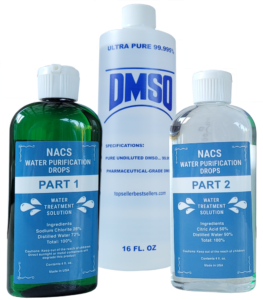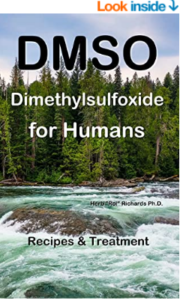Shoulder pain often stems from the frequent occurrence of rotator cuff tendons becoming entrapped beneath the bony structures within the shoulder, resulting in inflammation or damage. This condition is recognized as rotator cuff tendinitis or bursitis, and using the combination of MMS and DMSO may be a faster and better solution than pharmaceutical recommendations.
Shoulder pain can be attributed to various other factors, including:
- Arthritis affecting the shoulder joint.
- The presence of bone spurs in the shoulder region.
- Bursitis is characterized by inflammation of the bursa, a fluid-filled sac that typically cushions and facilitates smooth joint movement.
- Fractured shoulder bone.
- Shoulder dislocation.
- Shoulder separation.
- Frozen shoulder, is a condition marked by stiffness in the muscles, tendons, and ligaments within the shoulder, leading to painful and restricted movement.
- Overuse or injury to nearby tendons, such as the bicep muscles of the arms.
- Nerve damage resulting in abnormal shoulder movements.
- Tears in the rotator cuff tendons.
- Poor shoulder posture and mechanics.
It is important to note that on occasion, shoulder pain may originate from issues in other parts of the body, such as the neck or lungs, resulting in referred pain. Typically, this type of pain is experienced at rest and does not worsen with shoulder movement.
Natural Alternatives
As an increasing number of individuals assume greater responsibility for managing their own medical care, an expanding array of treatment options becomes accessible, offering patients natural alternatives to conventional medical interventions provided by highly trained healthcare practitioners. This shift in patient autonomy reflects a growing awareness among the public that the professional medical training received by doctors and healthcare professionals may warrant scrutiny. Concerns are raised that this training predominantly focuses on prescribing medications often promoted by pharmaceutical corporations primarily driven by profit motives rather than the singular goal of patient healing.
Critics argue that the prevailing pharmaceutical industry model is not primarily centered on patient well-being but instead prioritizes the prolonged management of patient’s medical conditions over extended periods. This emphasis on sustained patient management aligns with the profit-driven nature of pharmaceutical corporations, potentially leading to over-reliance on medications as a means of sustaining profitability rather than achieving the ideal outcome of patient health and recovery.
Doctor’s Recommendations
Among the various prescription options available to medical professionals, Nonsteroidal Anti-Inflammatory Drugs (NSAIDs) such as Voltaren, Cataflam, and Lofena (generic = Diclofenac) are often considered as primary choices. These medications, like most NSAIDs, have the potential to alleviate pain and enhance a patient’s range of motion. However, it is imperative to acknowledge that they also carry an elevated risk of severe cardiovascular thrombotic events, which encompass conditions like myocardial infarction and stroke and can have fatal consequences. It’s noteworthy that this risk can manifest early in the course of treatment and may escalate with prolonged usage. Furthermore, it is essential to emphasize that Diclofenac is contraindicated in patients who have undergone coronary artery bypass graft (CABG) surgery.
Additionally, NSAIDs are associated with an increased likelihood of critical gastrointestinal (GI) adverse events, including bleeding, ulceration, and perforation of the stomach or intestines, all of which can lead to fatal outcomes. These adverse events can occur at any point during NSAID usage, often without any warning symptoms. It’s crucial to recognize that elderly patients and individuals with a prior history of peptic ulcer disease and/or GI bleeding face a greater risk of experiencing serious GI complications when using NSAIDs. Consequently, the decision to prescribe NSAIDs should be made judiciously, considering both the potential benefits and the associated risks, while closely monitoring patients for any adverse effects.
Surgical Intervention
Should the medication management system fail to align with your personal performance standards and healthcare preferences, surgical interventions may emerge as a viable alternative, contingent upon your medical insurance coverage. Among the highly recommended surgical procedures are Arthroscopy, Rotator Cuff Repair, Acromioclavicular Repair, Biceps Tendon Surgery, and Full Replacement Surgery. These highly profitable surgical interventions can offer viable solutions for addressing shoulder-related issues, and their suitability is contingent upon individual medical needs and insurance provisions.
Natural Alternative Specialist’s Recommendations
Natural Alternative Specialists take an entirely different approach that will look something, like this:
Dietary Modification:
- Olive Oil
- Fatty fish such as salmon, sardines, mackerel, and tuna
- Tomatoes
- Various fruits like blueberries, strawberries, oranges, and cherries
- Nuts such as walnuts and almonds
- Green leafy vegetables, including kale, spinach, and collards
- Incorporating celery juice or beet juice
Herbs and Spices Recommendation:
- Ginger
- Cayenne
- Cinnamon
- Turmeric
Also suggested:
- Reducing the intake of processed foods
- Embracing a balanced diet that encompasses
- whole foods
- healthy fats
- carbohydrates
- protein
To contribute to your body’s natural healing processes.
Lifestyle adjustments:
- Limit alcohol consumption
- Restrict excessive consumption of sodas and caffeine to no more than 2 cups daily.
- Eliminate smoking and other tobacco products from your life.
Prioritize
- Adequate rest
- Ease into an exercise routine that suits your preferences and abilities
- Engage in healthy habits like
- Walking
- Yoga
- Pilates
Essential Oils
Many essential oils can be beneficial in dealing with shoulder pain, such as
- Peppermint oil
- Marjoram oil
- Lavender oil
Chlorine Dioxide and DMSO
A potential solution for addressing shoulder pain in professional athletes involves the utilization of a combination of compounds, namely chlorine dioxide and dimethyl sulfoxide (DMSO) in the field. It is worth noting that these compounds fall outside the conventional realm and have not received approval from the United States Food and Drug Administration (FDA). However, they have demonstrated notable efficacy in providing rapid relief for shoulder pain.
It is unlikely that the FDA will endorse the use of these compounds for human applications. One primary reason for this reluctance is their ready availability and significantly lower cost when compared to pharmaceutical drugs. Nonetheless, it is pertinent to observe that these compounds are frequently employed by veterinarians, particularly in situations where cost-effectiveness plays a pivotal role, such as in commercial applications, where the treatment of numerous animals necessitates economical solutions.
Chlorine Dioxide
Chlorine dioxide is a compound renowned for its remarkable pathogen-killing capabilities. It has garnered authorization from prominent institutions such as the CDC, EPA, and FDA for an array of industrial applications. These applications are crucial in safeguarding the general population against potential contamination in areas spanning food production, sanitation processes, and healthcare facilities. It’s noteworthy, however, that despite these official endorsements for industrial use, the FDA has prohibited its utilization for personal health purposes.
Author Paris Humble has delved into the subject of chlorine dioxide in his book, “Healthy Alternative Chlorine Dioxide Uses: Non-Pharmacological Health Restoration.” Within its pages, she advocates for the inclusion of chlorine dioxide in every emergency first-aid kit, highlighting its potential to promote health and well-being through non-pharmacological means. Note that Paris’ father, Jim Humble discovered the health benefits of chlorine dioxide and nicknamed it Miracle Mineral Solution or MMS for short. Jim Huble’s work is documented in his book, The Master Mineral Solution of the Third Millennium.
For shoulder injury, the application of chlorine dioxide could be a two-pronged approach.
1. Follow the Blood Stream
Consuming a diluted solution of chlorine dioxide, consisting of one or more drops dispersed in water and administered multiple times daily, facilitates the transport of this pathogen-killing agent through the bloodstream. It effectively co-utilizes the body’s inherent inflammatory response, directing it toward the affected area where pain is experienced.
2. Topical Application
An alternative approach for transporting chlorine dioxide to the site of pain involves blending the chlorine dioxide solution with a topical carrier compound, such as DMSO (dimethyl sulfoxide), and subsequently administering it to the area afflicted by shoulder pain through topical application.
What is DMSO?
DMSO (Dimethyl Sulfoxide) is a naturally derived solution obtained from trees, renowned for its extensive history as a solvent and an effective topical penetrant. In its role as a topical penetrant, DMSO readily integrates with various liquids, creams, or gels. When combined with another compound, it facilitates transdermal delivery through skin application, permeating all layers of protective skin, tissues, and even the blood-brain barrier.
Author Herb Roi Richards, Ph. D., proposes the amalgamation of DMSO and chlorine dioxide for transdermal application, allowing precise delivery of chlorine dioxide directly to the site of shoulder pain without the need for skin puncture. Further insights into this process can be found in his book, “DMSO Dimethylsulfoxide for Humans, Recipes & Treatment.”
When to Seek Medical Attention
1. Sudden Left Shoulder Pain
If you experience sudden pressure or crushing pain in your left shoulder, particularly if the pain radiates from your chest to the left jaw, arm, or neck, and is accompanied by symptoms like shortness of breath, dizziness, or sweating, it could potentially indicate a heart attack. In such cases, dial 911 or your local emergency number immediately.
2. Severe Injury
If you’ve recently sustained a severe shoulder injury resulting in intense pain, swelling, bruising, or bleeding, it’s advisable to visit the hospital emergency room promptly.
Shoulder Pain with Additional Symptoms: Contact your healthcare provider if you have shoulder pain combined with any of the following:
- Fever, swelling, or redness in the shoulder.
- Difficulty moving the shoulder.
- Persistent pain lasting more than 2 to 4 weeks, despite home treatment.
- Noticeable swelling of the shoulder.
- Abnormal skin coloration (red or blue) in the shoulder area.
Your Rights
In the United States, citizens have the fundamental right to seek their own medical remedies and explore alternative approaches to healthcare, including options outside the realm of conventional pharmacological medications. This right is deeply rooted in the principles of individual autonomy, personal freedom, and the right to make informed decisions about one’s own health. It aligns with the broader concept of healthcare freedom, where individuals have the liberty to choose their preferred methods of treatment and healthcare providers.
Alternative medical remedies encompass a wide spectrum of approaches, such as herbal remedies, dietary supplements, acupuncture, chiropractic care, naturopathy, and various forms of holistic and integrative medicine. Many Americans embrace these alternatives as they often prioritize a holistic understanding of health, addressing not only the symptoms but also the underlying causes of illnesses. This approach empowers individuals to actively participate in their healthcare decisions and tailor treatments to their unique needs and preferences.
However, it’s important to note that while individuals have the right to explore alternative remedies, they should also exercise caution and make informed choices. It’s advisable to consult with qualified natural alternative specialists or balanced healthcare professionals who can provide guidance, assess the safety and effectiveness of alternative treatments, and ensure that they do not pose undue risks to one’s health. The right to seek alternative medical remedies in the United States reflects the nation’s commitment to respecting individual choices and fostering a diverse and patient-centered healthcare landscape.



